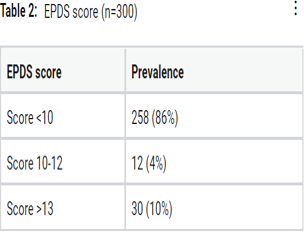Abstract
Postpartum depression is a grave mental health problem, which is more prevalent than society realizes and poses great risk. It has been associated with lack of breastfeeding, aversion towards the baby and negative impact on the development of the child. A total of 300 women who delivered between January 14 to March 31 of 2020 at Saveetha Medical College and Hospital were chosen following ethical clearance. After explaining the aspects of the Edinburgh Postpartum Depression Scale in their native language, the questionnaire was provided. A score of 10 and above were considered positive. Data were evaluated using SPSS and Chi square test. The prevalence of PPD was seen in 14% of women. It was higher with vaginal delivery, in women who had multiple births, lack of financial and social support, with domestic violence and alcoholic partner. Medical help was advised to women who scored 10 and above; only 5% sought medical intervention. Others did not recognize depression as a health issue. This shows the lack of awareness among the population. Medical health professionals should spread awareness, conduct more studies to evaluate the prevalence, the predisposing factors, methods for early diagnosis and ways to help women overcome “THE OTHER SIDE OF MOTHERHOOD”.
Full text article
References
Babatunde, T., Moreno-Leguizamon, C. J. 2012. Daily and Cultural Issues of Postnatal Depression in African Women Immigrants in South East London: Tips for Health Professionals. Nursing Research and Practice, pages 1–14.
Beestin, L., Hugh-Jones, S., Gough, B. 2014. The impact of maternal postnatal depression on men and their ways of fathering: an interpretative phenomenological analysis. Psychology and Health, 29(6):717–735.
Chandran, M., Tharyan, P., Muliyil, J., Abraham, S. 2002. Post-partum depression in a cohort of women from a rural area of Tamil Nadu, India. Incidence and risk factors. The British Journal of Psychiatry: The Journal of Mental Science, 181:499–504.
Cox, J. L., Holden, J. M., Sagovsky, R. 1987. Detection of postnatal depression: Development of the 10-item Edinburgh Postnatal Depression Scale. The British Journal of Psychiatry: The Journal of Mental Science, 150:782–786.
DSM-5 2013. Diagnostic and statistical manual of mental disorders. 5th Edition. Arlington: American Psychiatric Association. ISBN: 9780890425541.
Gibbs, R. S., Karlan, B. Y., Haney, A. F., Nygaard, I. 2008. Danforth’s obstetrics and gynaecology. 10th Edition. Philadelphia. Lippincott, Williams and Wilkins. ISBN: 978-0-78176-937-2.
Glavin, K., Leahy-Warren, P. 2013. Postnatal Depression is a Public Health Nursing Issue: Perspectives from Norway and Ireland. Nursing Research and Practice, pages 1–7.
Khan, T. M. 2011. Interventions during pregnancy to lower the chances of postnatal depression among women from the Asian subcontinent. Mental Health in Family Medicine, 8(1):7–9.
Khan, T. M., Arif, N. H. B., Tahir, H., Anwar, M. 2009. Role of the husband’s knowledge and behaviour in postnatal depression: a case study of an immigrant Pakistani woman. Mental Health in Family Medicine, 6(4):195–201.
O’hara, M. W. 2009. Postpartum depression: what we know. Journal of Clinical Psychology, 65(12):1258–1269.
O’hara, M. W., Mccabe, J. E. 2013. Postpartum depression: current status and future directions. Annual Review of Clinical Psychology, 9:379–407.
O’hara, M. W., Swain, A. M. 1996. Rates and risk of postpartum depression-a meta-analysis. International Review of Psychiatry, 8(1):37–54.
Patel, V., Rodrigues, M., Desouza, N. 2002. Gender, poverty, and postnatal depression: a study of mothers in Goa. India. The American Journal of Psychiatry, 159(1):43–47.
Pitt, B. 1968. ”Atypical” depression following childbirth. The British Journal of Psychiatry: The Journal of Mental Science, 114(516):1325–1335.
Santos, H. P. O., Sandelowski, M., Gualda, D. M. R. 2014. Bad thoughts: Brazilian women’s responses to mothering while experiencing postnatal depression. Midwifery, 30(6):788–794.
Scope, A., Leaviss, J., Kaltenthaler, E., Parry, G., Sutcliffe, P., Bradburn, M., Cantrell, A. 2013. Is group cognitive behaviour therapy for postnatal depression evidence-based practice? A systematic review. BMC Psychiatry, 13:321.
Teissedre, F., Chabrol, H. 2004. A study of the Edinburgh Postnatal Depression Scale (EPDS) on 859 mothers: detection of mothers at risk for postpartum depression. L’Encephale, 30(4):95451–95457.
Authors

This work is licensed under a Creative Commons Attribution-NonCommercial-NoDerivatives 4.0 International License.

